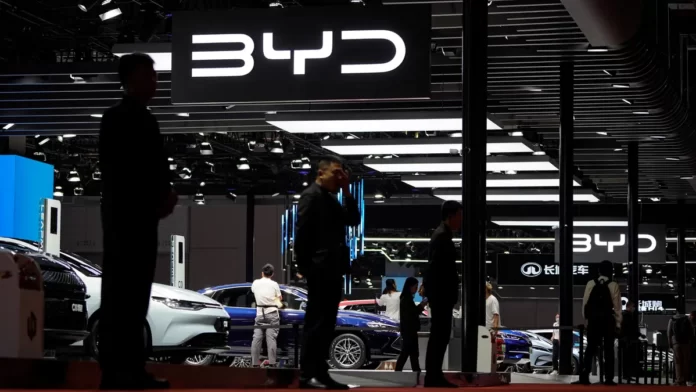Chinese electric vehicle champion BYD has slowed its production and expansion pace in recent months by reducing shifts at some factories in China and delaying plans to add new production lines, said two people with knowledge of the matter.
The decisions are a sign that BYD’s robust sales growth over the past couple of years that drove it to overtake Tesla as the world’s largest EV maker could slow, as it grapples with rising inventory even after offering deep price cuts in China’s cutthroat auto market.
BYD has cancelled night shifts and reduced output by at least a third of the capacity at some of its factories, said the sources who declined to be named because the matter is private.
These previously unreported measures were imposed on at least four factories and BYD had also suspended some plans to set up new production lines, one of the people said.
BYD, which sold 4.27 million cars last year, mostly in China, has at least seven car factories in the country and it has targeted a near-30% rise in sales to 5.5 million this year.
Reuters was not able to identify the exact scale of the production reduction and expansion suspension, nor to ascertain how long these measures may last. One of the sources said the moves were aimed at saving costs, while the other said they were imposed after sales failed to meet targets.
BYD did not immediately respond to a request for comment.
Shares of Hong Kong-listed BYD gave up earlier gains of as much as 2.6% and fell nearly 1% in late Wednesday afternoon trade after Reuters reported its production cut measures.
Data from the China Association of Automobile Manufacturers showed growth of BYD’s output had slowed to 13% and 0.2% year-on-year in April and May, respectively, both of which were the slowest pace since February 2024 when factory activities were disrupted by a week-long lunar New Year holiday.
BYD started ramping up monthly output from the second quarter of the year in 2023 and 2024, the data showed. But the trend has changed this year, with average output in April and May 29% lower than in the fourth quarter of 2024.
BYD has risen to become the world’s largest EV maker within the span of a few years by aggressively increasing production and speeding up the rollout of new and more affordable models.
Its recent price incentives, which reduced the starting price of its cheapest model to 55,800 yuan ($7,800), triggered a broader selloff in Chinese auto stocks and fresh price cuts from rivals.
A survey conducted by the China Automotive Dealer Association in May found that BYD dealers held an average inventory of 3.21 months, the highest among all brands in China, whereas the inventory level industry-wide was at 1.38 months.
A large BYD dealer in the eastern province of Shandong has gone out of business with at least 20 of its stores found to be deserted or shut, government-owned media reported last month.
As inventory levels increase, the China Auto Dealers Chamber of Commerce in early June called on automakers to stop offloading too many cars on dealerships and to set “reasonable” production targets based on sales performance. The group said intense price wars were pressuring cash flow and driving down profitability.
Chinese auto dealers on Monday urged automakers to pay cashback incentives within 30 days to help to alleviate financial pressures.
Deepening price competition has prompted Chinese regulators to increase their scrutiny of the auto sector in recent months as the years-long practice has squeezed suppliers, automakers and dealers across the industry.
Chinese automakers are now increasingly looking for overseas markets to prop up sales and offset weakening momentum in their home market.
In the first five months of this year, BYD sold 1.76 million vehicles, of which around 20% were exported.























